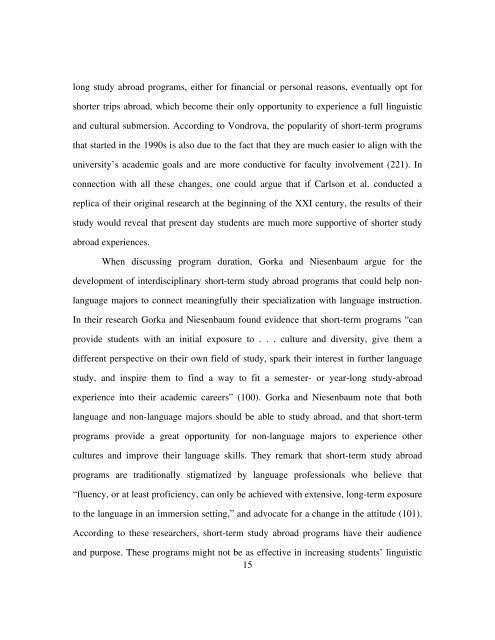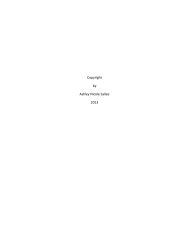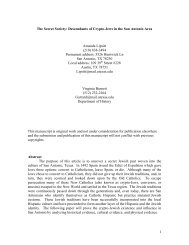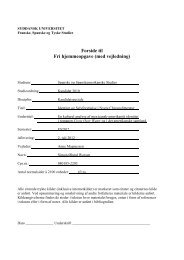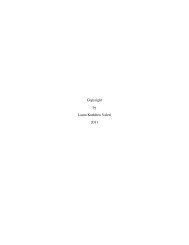Copyright by Tatiana Borisovna Segura 2008 - The University of ...
Copyright by Tatiana Borisovna Segura 2008 - The University of ...
Copyright by Tatiana Borisovna Segura 2008 - The University of ...
You also want an ePaper? Increase the reach of your titles
YUMPU automatically turns print PDFs into web optimized ePapers that Google loves.
long study abroad programs, either for financial or personal reasons, eventually opt for<br />
shorter trips abroad, which become their only opportunity to experience a full linguistic<br />
and cultural submersion. According to Vondrova, the popularity <strong>of</strong> short-term programs<br />
that started in the 1990s is also due to the fact that they are much easier to align with the<br />
university’s academic goals and are more conductive for faculty involvement (221). In<br />
connection with all these changes, one could argue that if Carlson et al. conducted a<br />
replica <strong>of</strong> their original research at the beginning <strong>of</strong> the XXI century, the results <strong>of</strong> their<br />
study would reveal that present day students are much more supportive <strong>of</strong> shorter study<br />
abroad experiences.<br />
When discussing program duration, Gorka and Niesenbaum argue for the<br />
development <strong>of</strong> interdisciplinary short-term study abroad programs that could help non-<br />
language majors to connect meaningfully their specialization with language instruction.<br />
In their research Gorka and Niesenbaum found evidence that short-term programs “can<br />
provide students with an initial exposure to . . . culture and diversity, give them a<br />
different perspective on their own field <strong>of</strong> study, spark their interest in further language<br />
study, and inspire them to find a way to fit a semester- or year-long study-abroad<br />
experience into their academic careers” (100). Gorka and Niesenbaum note that both<br />
language and non-language majors should be able to study abroad, and that short-term<br />
programs provide a great opportunity for non-language majors to experience other<br />
cultures and improve their language skills. <strong>The</strong>y remark that short-term study abroad<br />
programs are traditionally stigmatized <strong>by</strong> language pr<strong>of</strong>essionals who believe that<br />
“fluency, or at least pr<strong>of</strong>iciency, can only be achieved with extensive, long-term exposure<br />
to the language in an immersion setting,” and advocate for a change in the attitude (101).<br />
According to these researchers, short-term study abroad programs have their audience<br />
and purpose. <strong>The</strong>se programs might not be as effective in increasing students’ linguistic<br />
15


